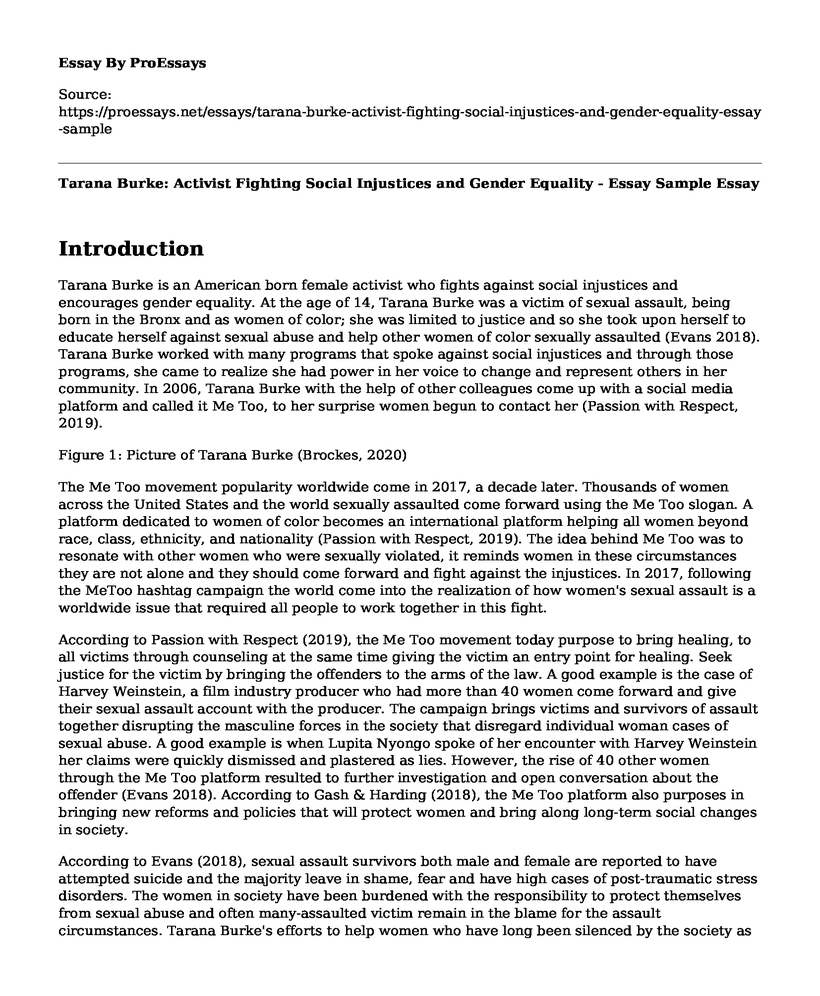Introduction
Tarana Burke is an American born female activist who fights against social injustices and encourages gender equality. At the age of 14, Tarana Burke was a victim of sexual assault, being born in the Bronx and as women of color; she was limited to justice and so she took upon herself to educate herself against sexual abuse and help other women of color sexually assaulted (Evans 2018). Tarana Burke worked with many programs that spoke against social injustices and through those programs, she came to realize she had power in her voice to change and represent others in her community. In 2006, Tarana Burke with the help of other colleagues come up with a social media platform and called it Me Too, to her surprise women begun to contact her (Passion with Respect, 2019).
Figure 1: Picture of Tarana Burke (Brockes, 2020)
The Me Too movement popularity worldwide come in 2017, a decade later. Thousands of women across the United States and the world sexually assaulted come forward using the Me Too slogan. A platform dedicated to women of color becomes an international platform helping all women beyond race, class, ethnicity, and nationality (Passion with Respect, 2019). The idea behind Me Too was to resonate with other women who were sexually violated, it reminds women in these circumstances they are not alone and they should come forward and fight against the injustices. In 2017, following the MeToo hashtag campaign the world come into the realization of how women's sexual assault is a worldwide issue that required all people to work together in this fight.
According to Passion with Respect (2019), the Me Too movement today purpose to bring healing, to all victims through counseling at the same time giving the victim an entry point for healing. Seek justice for the victim by bringing the offenders to the arms of the law. A good example is the case of Harvey Weinstein, a film industry producer who had more than 40 women come forward and give their sexual assault account with the producer. The campaign brings victims and survivors of assault together disrupting the masculine forces in the society that disregard individual woman cases of sexual abuse. A good example is when Lupita Nyongo spoke of her encounter with Harvey Weinstein her claims were quickly dismissed and plastered as lies. However, the rise of 40 other women through the Me Too platform resulted to further investigation and open conversation about the offender (Evans 2018). According to Gash & Harding (2018), the Me Too platform also purposes in bringing new reforms and policies that will protect women and bring along long-term social changes in society.
According to Evans (2018), sexual assault survivors both male and female are reported to have attempted suicide and the majority leave in shame, fear and have high cases of post-traumatic stress disorders. The women in society have been burdened with the responsibility to protect themselves from sexual abuse and often many-assaulted victim remain in the blame for the assault circumstances. Tarana Burke's efforts to help women who have long been silenced by the society as victims of rape has slowly been rewarding as more people through the platform continue to tell their stories (Gash & Harding, 2018). The stigmatization imposed by society against the victim is slowly ending and women have a brighter future.
The Me Too campaign is a revelation of the social injustices committed against women in silence. This does not mean women are endangered species but this calls for the need to re-evaluate and redefining of sexual harassment in the society and workplaces. Sexual harassment should be seen as a form of sexism and not sexual desire or sex. Women's sexual harassment has often been used by the masculine in the society to dominate women as an inferior being and giving room for masculine idealized agendas in the society and workplaces rule over. The Me Too program however comes to defy the masculine trajectory by seeking equality for both men and women by redefining the traditional masculine approaches such as sexual harassment.
References
Evans, A. (2018). # MeToo: A Study on Sexual Assault as Reported in the New York Times. Occam's Razor, 8(1), 3. https://cedar.wwu.edu/cgi/viewcontent.cgi?article=1051&context=orwwu
Passion with Respect (2019). ‘Me too.’ MOVEMENT: WHERE IT’S BEEN AND WHERE IT’S GOING. Kentucky Bar Association annual convention. Evolution Creative Solutions https://cdn.ymaws.com/www.kybar.org/resource/resmgr/2019_convention/materials/_me_too.__movement_-_where_i.pdf
Gash, A., & Harding, R. (2018). # MeToo? Legal discourse and everyday responses to sexual violence. Laws, 7(2), 21. https://doi.org/10.3390/laws7020021
Brockes, E. (2020). #MeToo founder Tarana Burke: ‘You have to use your privilege to serve other people’. Retrieved 3 June 2020, from https://www.theguardian.com/world/2018/jan/15/me-too-founder-tarana-burke-women-sexual-assault
Cite this page
Tarana Burke: Activist Fighting Social Injustices and Gender Equality - Essay Sample. (2023, Aug 23). Retrieved from https://proessays.net/essays/tarana-burke-activist-fighting-social-injustices-and-gender-equality-essay-sample
If you are the original author of this essay and no longer wish to have it published on the ProEssays website, please click below to request its removal:
- Interfaith Religious Marriage Paper Example
- Essay Sample on Drugs and Human Behaviors
- Gun Laws in the US: Debate & Consequences - Essay Sample
- Effective Communication: Verbal & Non-Verbal - Research Paper
- Essay Sample on Chinese Women: Politics, Love, and Identity
- Essay Example on Building Better Relationships Through Trade Unions
- Essay Example on Women's Strength: Mary Wollstonecraft's Reflections on Equality







